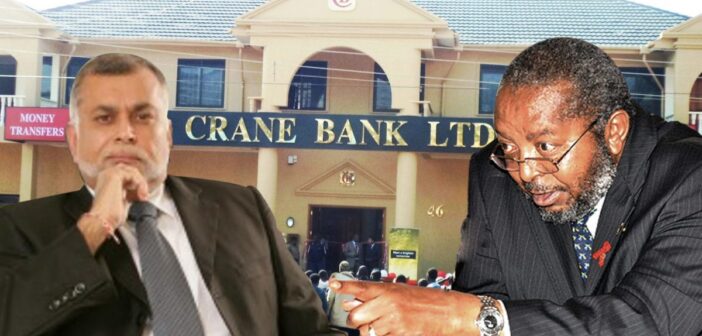The Central Bank through it’s Governor Prof. Emmanuel Tumusiime Mutebile on Friday November 13, 2020 issued an order to liquidate former Crane Bank Limited in receivership which was fraudulently sold to DFCU bank by officials in bank of Uganda in 2016.
“In exercise of its powers under section 99 (1) & (2) of the Financial Institutions Act, 2004, BoU has now placed CBL under liquidation and ordered the winding up of its affairs. The Central Bank shall be the liquidator of CBL,” a BoU notice signed by Governor Tumusiime Mutebile stated.
However, several legal minds have weighed on saying that the move is unlawful and would cost taxpayers a lot of money should it go ahead.
According to Financial Legal pundits, the Powers of the Central Bank over banks is granted and governed by the Financial Institutions Act (FIA). It is not arbitrary. That Act sets out the powers and their limits and what the Central Bank can and cannot do.
It should be remembered that BoU took over Crane Bank in October 2016, citing undercapitalisation and sold it to DFCU in January 2017.
However, in 2019 former Crane Bank Vice Chairman Dr. Sudhir Ruparelia triumphed over BoU in a landmark Shs397 billion case and he says he is ready to take BoU to the Supreme Court in case they attempt to liquidate Crane Bank.
“It is contempt of court and we going to apply for contempt of Court at Supreme Court,” Sudhir says.
What does the Law Say?
According to lawyers quoted, the move is outside the powers granted to the Central Bank by the Financial Institutions Act (FIA).
Section 95 of the FIA permits BOU to close a bank (i.e. take away its banking license) and then place it under Receivership.
On January 18th 2017, CBL was closed as a bank (and it ceased to be a licensed bank) and was placed into Receivership by the Central Bank. It ceased to be a licensed financial institution when it was placed in receivership. All of this was within BOU’s power under the FIA, which allowed it to close the bank and to place it into receivership.
In both HCCS 493/2017 and Civil Appeal 252/2019, both filed by BOU to assert powers as Receiver of CBL, the High Court and the Court of Appeal both found that the Receivership of CBL ended 12 months after it commenced (i.e. January 2018).
After this date when the courts of law determined that receivership had ended, BOU lost all legal authority over the affairs of CBL. It must be remembered that BOU’s authority is granted by the FIA and is limited by the FIA. Both Courts found that under the FIA, BOU’s authority as Receiver of CBL ended in January 2018. This means that after that date, BOU has no authority to make any decisions of any kind for CBL. Like at the end of all receiverships, the company is returned to its Board of Directors and Shareholders. After January 2018, CBL by law was supposed to return to its Board of Directors and Shareholders.
BOU appealed the decisions of the two courts right up to the Supreme Court.
The Supreme Court case is going to be heard in January 2021. The Judgments of the High Court and the Court of Appeal which state that Receivership ended are still in force and binding on all parties. They have never been stayed or set aside. BoU tried to stay the enforcement of the Judgment of the High Court in the Court of Appeal and lost that application.
BoU also tried to stay the enforcement of the Judgment of the Court of Appeal and also lost that application in the Supreme Court. Both BOU’s attempts to stay were dismissed with costs against BoU. The current state of the law is that Receivership ended and BoU has no power or authority over the affairs of CBL.
BoU cannot now move CBL into liquidation because of two fundamental reasons:
Firstly, it has no authority over CBL matters as shown above and all attempts to restore authority have been dismissed by both the Court of Appeal and the Supreme Court.
The purported placing of CBL into liquidation is illegal and is an abuse of office by the Bank of Uganda. It is also an act of contempt of the Supreme Court in that there is a pending appeal before the Court and BoU is illegally trying to take matters into its own hands to circumvent a binding legal judgment by purporting to move CBL into Liquidation.
Such a move will render the appeal they filed in the Supreme Court moot and violates the binding decision of the Court of Appeal that Receivership ended which has not been set aside or stayed by the Supreme Court. A receiver without authority cannot progress CBL from Receivership to liquidation.
Secondly, CBL ceased to be a Financial Institution within the meaning of the FIA when its license to do banking business was taken away in January 2017 (when it was put under receivership). CBL has not been on the list of licensed financial institutions since then (see BOU website for list of licensed institutions). BOU has powers under Section 99 of the FIA to place licensed financial institutions in liquidation.
That power only applies to FINANCIAL INSTITUTIONS, which are legally defined under Section 3 of the FIA to mean companies licensed to do financial institutions business. CBL has no such license on November 13th 2020, and is therefore not a financial institution that BoU can place into liquidation today.


